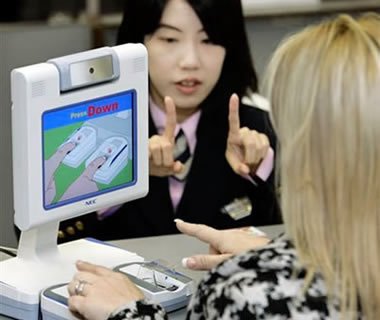I want to live in Japan!

A guide to visas, immigration and moving to Japan
Before you pack your bags and buy your plane ticket there are some things you need to know.
What is your nationality? This will determine:
- How long you can stay as a tourist/visitor
- If you qualify for ‘visa exemption’ (meaning you do not have to get your tourist/visitor visa approved before coming to Japan. You will just arrive at the airport, and they will ask you the nature of your visit, and stamp your passport that you’re visiting)
- If you qualify or not for a special ‘working holiday visa’.
Depending on your nationality you may be eligible for a “visa exemption” meaning that your country has an agreement with Japan and you need no visa to enter the country, you just come with your passport and they stamp it as a visitor/tourist. For countries not so lucky they can’t even visit Japan without first getting their visitor visa approved.
NOTE if you are from China, Russia or NIS countries, or the Philippines, Click here: http://www.mofa.go.jp/j_info/visit/visa/index.html For others, continue:
Visa Exemption List for Visiting
Here is a table with information on Visa Exempt Countries:
|
Countries with Visa Exemption Agreements (as of September 2009)
|
|
|
Term of residence
|
Country
|
|
14 days or less
|
Brunei |
|
90 days or less
|
Andorra, Argentina, Australia, Bahamas, Barbados, Belgium, Bulgaria, Canada, Chile, Costa Rica, Croatia, Cyprus, Czech Republic, Denmark, Dominican Republic, El Salvador, Estonia, Finland, France, Greece, Guatemala, Honduras, Hong Kong (BNO. SAR) Hungary, Iceland, Israel, Italy, Korea, Latvia, Lesotho, Lithuania, Luxembourg, Macedonia, Malta, Mauritius, Monaco, Netherlands, New Zealand, Norway, Poland, Portugal, Romania, San Marino, Slovakia, Slovenia, Singapore, Spain, Surinam, Sweden, Taiwan, Tunisia*, Turkey, Uruguay, U.S.A. |
|
180 days or less*
|
Austria, Germany, Ireland, Liechtenstein, Mexico, Switzerland, United Kingdom |
|
*Nationals of countries that have Visa Exemption Agreements for stays of up to 180 days, in principle, are granted permission to stay in Japan for 90 days at the time of landing. Of these nationals, those who wish to stay more than 90 days must apply at the nearest immigration authority in Japan for an extension.
* Persons holding a valid Non-Machine-Readable passport issued by Barbados, Lesotho (since 1 April 2010), and Turkey (since 1 April 2011) need a visa to enter Japan.* These nationals holding valid biometric passports containing an electronic chip will be exempt from the visa requirement.
* The visa waiver regime only applies to Serbian nationals holding e-passports.*
*In the case of Tunisia, even under the current visa waiver arrangement, it is recommended that Tunisian nationals, who make short term stays in Japan during the period between April 1st and July 9th, 2008, obtain visas. |
|
| The above information is subject to change without notice. | |
SOURCE: http://www.vancouver.ca.emb-japan.go.jp/en/visa/temporary.htm
The Border Trick
So you’ve determined your nationality and how long you can stay on your visitor Visa. What’s next? Well I’m sure many of you are asking yourselves the questions: Can I do like travelers do in Thailand? Cross the border into Cambodia when my visa is up and stay over night and come back the next day to Thailand with a new visa and do this for the rest of my life?
Well that may work in Thailand, but it certainly won’t work in Japan. There is an unwritten but strongly agreed upon ’180’ day rule for a visitor in Japan. Meaning form the time you enter Japan to one year later you get 180 days in Japan.
This means then that you could only do the ‘border’ trick once. Yes that is the case.
A note of caution on the 90 day border maneuver, it is recommended that you don’t take the ferry or a plane to Korea for the day and then come back to Japan. Some people have been turned back. Your best bet is to go visit Hong Kong or Taiwan for a few days and then return.
You should also note that ANY time you are entering Japan you MUST have a departing ticket. Not necessarily in your possession but you need to know the flight and your itinerary number. You will not be permitted entry if you have no departing flight.
What can I do on a tourist/visitor Visa?
Not much, you can do tourism and visiting. You CANNOT work.
Now, at this time you may be feeling very broken-hearted as your dreams of moving to Japan have been crushed. Only 180 days? Well its not bad. But if you want to reside there you’re going to have to take another approach. You’ll have to get a proper visa. There are MANY kinds for many different situations. Here is a list:
Japanese Visas
Working visaProfessor (Examples: university professor, assistant professor, assistant, etc.) General visaCultural activities (Examples: unpaid internships, people studying the tea ceremony or Japanese flower arranging, etc.) Specified visaSpouse, etc. of a Japanese national (Examples: spouse of a Japanese national, biological child of a Japanese national) Diplomatic visaDiplomatic (Examples: constituent members of diplomatic mission, diplomatic couriers, etc.) Official visaOfficial (Examples: administrative and technical employees of diplomatic missions and members of the service staff, etc.)
|
We are not going to take up ALL of these but we will take up a few. Firstly there are three sections I want to point your attention to: “working visa”, “General Visa” and “specified visa”
Working Visa
It means exactly what it says, you will be working for a company as an employee of some sort. The company has to sponsor you in order for you to work for them. Also you have to work for THAT company, you can’t be sponsored for them, go to Japan and then get a another job, that would null your working visa.
Notice there is a category there for artists. That doesn’t mean that a street performer can just apply and get approved. You still have to get sponsored by a company to hire you as an artist, and you have to show a record of being in this industry in your home country, and that records that you support yourself by doing this activity.
More Details:
http://english.narita-visa.jp/service/
General Visa
Student Visa
One option for this would be a student visa, where you are going to Japan to learn Japanese and are enrolled at a school. The fee for the school will be around $500 a month, so you’ll need to have funds to pay for that. You will NOT be permitted to work and make income. The minimum amount you must study at the school a week is 20 hours. This gets more difficult with the fact that in order for the school to accept you, you will have to take a Japanese Proficiency exam which is required by the government. It is called J Test:
The test is delivered and written in full kanji, hiragana and katakana. You’d need to have a Grade 5 or 6 level of Japanese in order to understand and pass this test. Which means you’d have to have a high intermediate/ or advanced level. But not fluent.
Here are some samples of the test:
http://j-test.jp/xp/modules/tinyd10/content/ADsample.pdf
http://j-test.jp/xp/modules/tinyd10/content/ADsampleans.pdf (answers)
Cultural Activities Visa
An other option is the Cultural Activities Visa, where you have been studying and practicing in your home country a particular art of Japanese culture and you want to go to Japan to become an apprentice and or learn from a master. In this case you have to show proof of your involvement in this activity over a period of time (it should be more than one year).
There is not a set amount of time you must engage in this activity per week in Japan but it supposed to be the main thing on your schedule.
You must find a teacher or master in Japan who is willing to sponsor you and then apprentice you, he may charge you. So you will have to pay in that case. If it is an intership/apprenticeship then you would not pay as you’d be working for him for free, doing that activity (sushi making, Japanese flower arrangement, karate)
Learning Japanese does NOT count as a cultural activity.
The trouble with these two visas is that you cannot make any money. (with the exception of the Cultural Visa, you may apply to get a part time job working no more than 20 hours a week) But if you're a student then you’ll have to find a way to support yourself.
Specified Visa
Spousal Visa
Its no doubt you’ve already thought of just going to Japan and hoping you find the man/woman of your dreams and get married and then all your Japanese visa issues would be solved. Well it does happen sometimes in the real world and is an option.
If you think you could find the love of your live in the 180 days that you are permitted to be in Japan as a tourist in one year, and get married then by all means give it a go. As long as it is completely legitimate and honest you should have no problems. Just make sure you document everything, keep letters, photos anything that shows how long you were together and moments together. And of course know your partner’s background well, as when you go to get interviewed by immigration they will check to see if you know.
Seeing that you want to move to Japan and live there, it would not be a wild assumption to assume that you would want to marry a Japanese person.
Special Visa
Working Holiday Visa
The Working Holiday Visa is without a doubt the best visa option, however there are MANY restrictions and Americans cannot participate unfortunately. The only Countries that can participate are: (and then there are age restrictions) Citizens of:
- Australia
- New Zealand
- Canada
- The Republic of Korea
- France
- Germany
- The United Kingdom
- Ireland
- Denmark
- Residents of Taiwan
or Hong Kong
Each country has its restrictions on age. Consult this page to find out:
http://www.mofa.go.jp/j_info/visit/w_holiday/index.html
Working Holiday Visas last for 6 months or one year and are only issued once. You must be in your home country to apply for one, and once approved you can then go to Japan.
You are permitted to do any kind of legal paying activity with a Working Holiday visa, and you don’t have to work if you don’t want to, you can just travel around if you see fit.
Conclusion
So that’s the skinny. If you want to move to Japan then you need to get a visa. If you want to visit for 6 months (180 days) and are on the above Visa Exempt list then by all means visit for 6 months.
Related Pages





